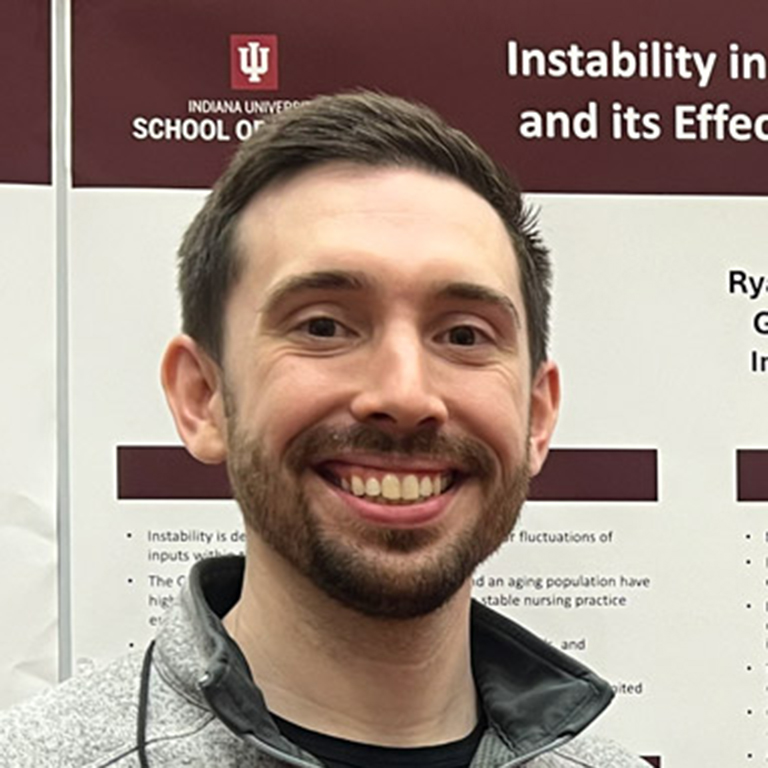Our PhD program prepares you for a career as a nurse scientist with the ability to generate research to enhance the care of individuals and families across the lifespan. PhD-prepared nurses lead the profession, teach the next generation of nurses, and expand nursing’s impact on health policy and public health.
Fellowships Available
The IU School of Nursing offers competitive funding for PhD students, including tuition remission, a stipend, and health insurance.
Is a PhD right for you?
The PhD program is primarily taught in-person on the IU Indianapolis campus, although some courses may be in online or hybrid formats. We attempt to schedule the required PhD courses across one day each week so that students know in advance which day to plan to be available for class.
This program features both a Master of Science in Nursing to PhD pathway, as well as a Bachelor of Science in Nursing to PhD path. The MSN-PhD can be accomplished in three years as a full time student, or five years as a part time student. The BSN-PhD can be accomplished in four years as a full-time student, or six years as a part-time student.
As a PhD student, you are paired with a faculty researcher who provides supportive mentoring throughout your entire PhD program. There is one core curriculum, but you can choose to work with faculty experts on one of two tracks: Clinical Nursing Science or Health Systems.

This program equips nurses to add to the body of nursing knowledge and translate findings into organizational and community outcomes.
Ryan Page
Are you passionate about research?
Faculty spotlight: Dr. Andrea Tanner
Andrea Tanner, PhD, RN, NCSN, FNASN, began her career as a school nurse before joining the PhD program at the IU School of Nursing. She is currently an assistant professor researching the mental health crisis among children and adolescents in schools.
Two research tracks to choose from
Clinical Nursing Science
Clinical nursing science concentrates on the intersections of health promotion, health behavior, and quality of life in acute and chronic illness throughout the lifespan to enhance the health and well-being of individuals, families, and communities. Examples of scholarship and faculty research in clinical nursing science include:
- Prevention and early detection of disease
- Improving the quality of life of persons with chronic illness
- Behavioral oncology across the cancer continuum
- Childhood and family adaptation to chronic illness
- Family caregiving across the lifespan
- Tailored intervention studies to improve quality of life
- Patient care safety
Health Systems
Health systems operate to create structures and resources that enable individuals and communities to achieve optimal health. Examples of scholarship and faculty research within the focus of health systems include:
- Health policy and public policy analysis
- Nursing workforce
- Computer systems to enhance care delivery
- Nursing informatics
- Community-based care coordination
PhD in Nursing Science curriculum
| Description | Course | Credits |
| Responsible Conduct of Research | NURS-D602 | 1 |
| Nursing Inquiry and Scholarship: Introduction to Doctoral Study | NURS-D701 | 3 |
| Preparing Future Faculty | NURS-T800 | 2 |
| Total | 6 | |
| Description | Course | Credits |
| Theoretical Perspectives of Nursing Science | NURS-D607 | 3 |
| Middle Range Theory | NURS-D608 | 3 |
| Total | 6 | |
| Required Courses | ||
|---|---|---|
| Description | Course | Credits |
| Advanced Statistics in Nursing Research | NURS-R607 | 3 |
| Foundations of Quantitative Research | NURS-R603 | 3 |
| Foundations of Qualitative Research | NURS-R610 | 3 |
| Total | 9 | |
| Cafeteria Options: Select TWO FROM THE FOLLOWING FOR A TOTAL of SIX (6) CREDITS | ||
|---|---|---|
| Description | Course | Credits |
| Trans-disciplinary Approaches to Influencing Health Policy | NURS-D743 | 3 |
| Instrumentation and Measurement | NURS-R601 | 3 |
| Design and Applications of Advanced Research Designs/Interventions | NURS-R605 | 3 |
| Grounded Theory Research | NURS-R613 | 3 |
| Comparative Effectiveness Research and Patient‐Centered Outcomes Research (CER/PCOR) | NURS-R615 | 3 |
| Symptom Science: Models, Methods, and Measures | NURS-R703 | 3 |
| Developing Grant Applications for Health Sciences | NURS-R704 | 3 |
| Writing for Publication in Health Sciences | NURS-W540 | 3 |
| Required | ||
|---|---|---|
| Description | Course | Credits |
| State of the Science Seminar | NURS-D609 | 2 |
| Directed Research Practicum | NURS-D752 | 3 |
| Total | 5 | |
| Choose ONE for a TOTAL OF THREE (3) CREDITS | ||
|---|---|---|
| Description | Course | Credits |
| Advanced Leadership in Complex Systems | NURS-D721 | 3 |
| Biological and Behavioral Foundations of Self-Management Interventions | NURS-R702 | 3 |
| Symptom Science: Models, Methods, and Measures | NURS-R703 | 3 |
| Description | Course | Credits |
| Cognate or supporting course work from inside or outside nursing. May include a minor in an alternate focus area, other approved minors, or individualized plans. | 9 - 12 | |
| Total | 9 - 12 | |
| Description | Course | Credits |
| Dissertation in Nursing | NURS-R899 | 16 |
| Total | 16 | |
Learning outcomes
As a PhD graduate, you are well-positioned for a successful career as a leader within academic and practice settings. Graduates of the program are expected to:
- Synthesize knowledge from nursing as well as biological and behavioral sciences to investigate health phenomena.
- Utilize analytical and empirical methods to extend nursing knowledge and scholarship.
- Conduct and communicate independent research that advances the body of scientific knowledge.
- Defend the social significance of the expanded knowledge base of nursing.
- Interpret nursing science within an interdisciplinary context.


